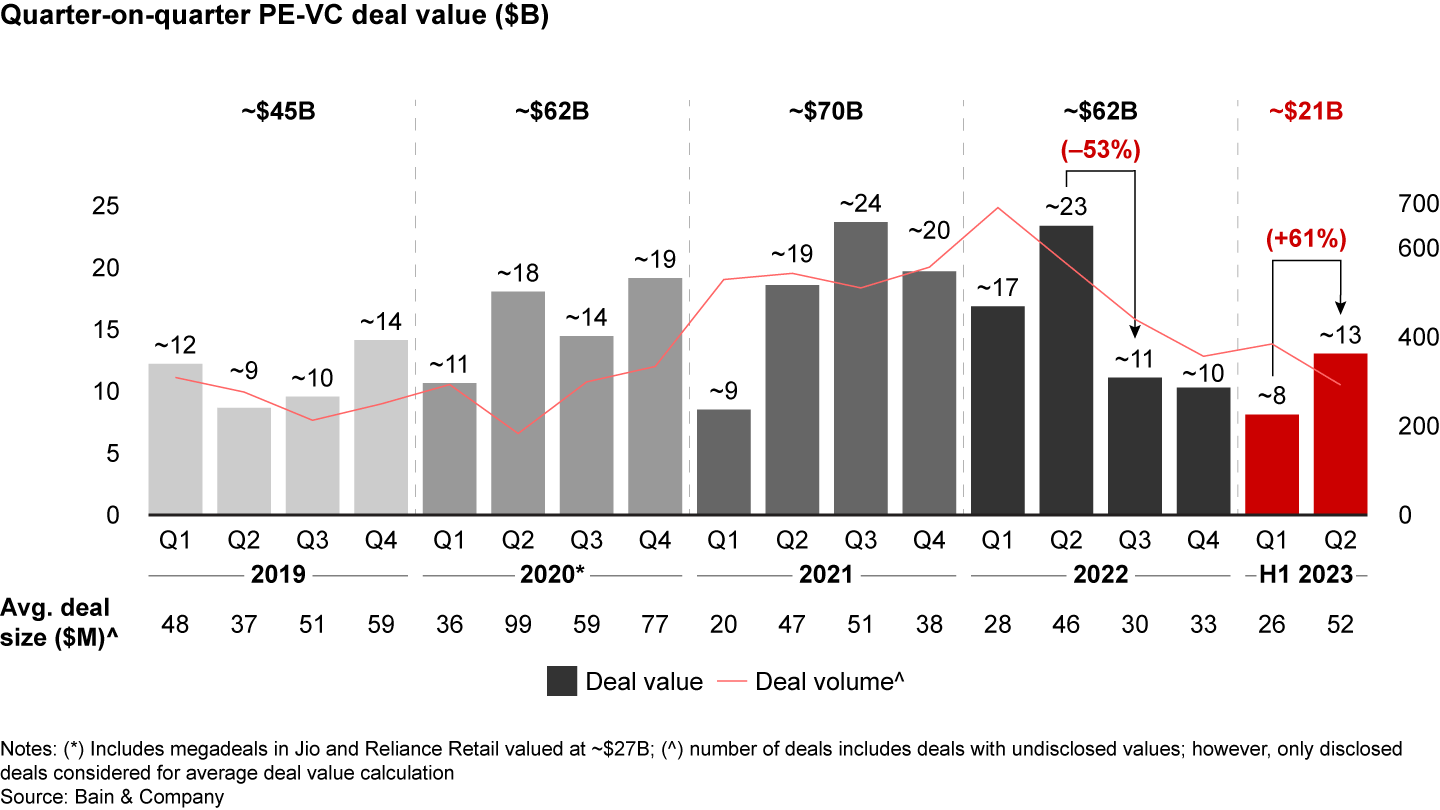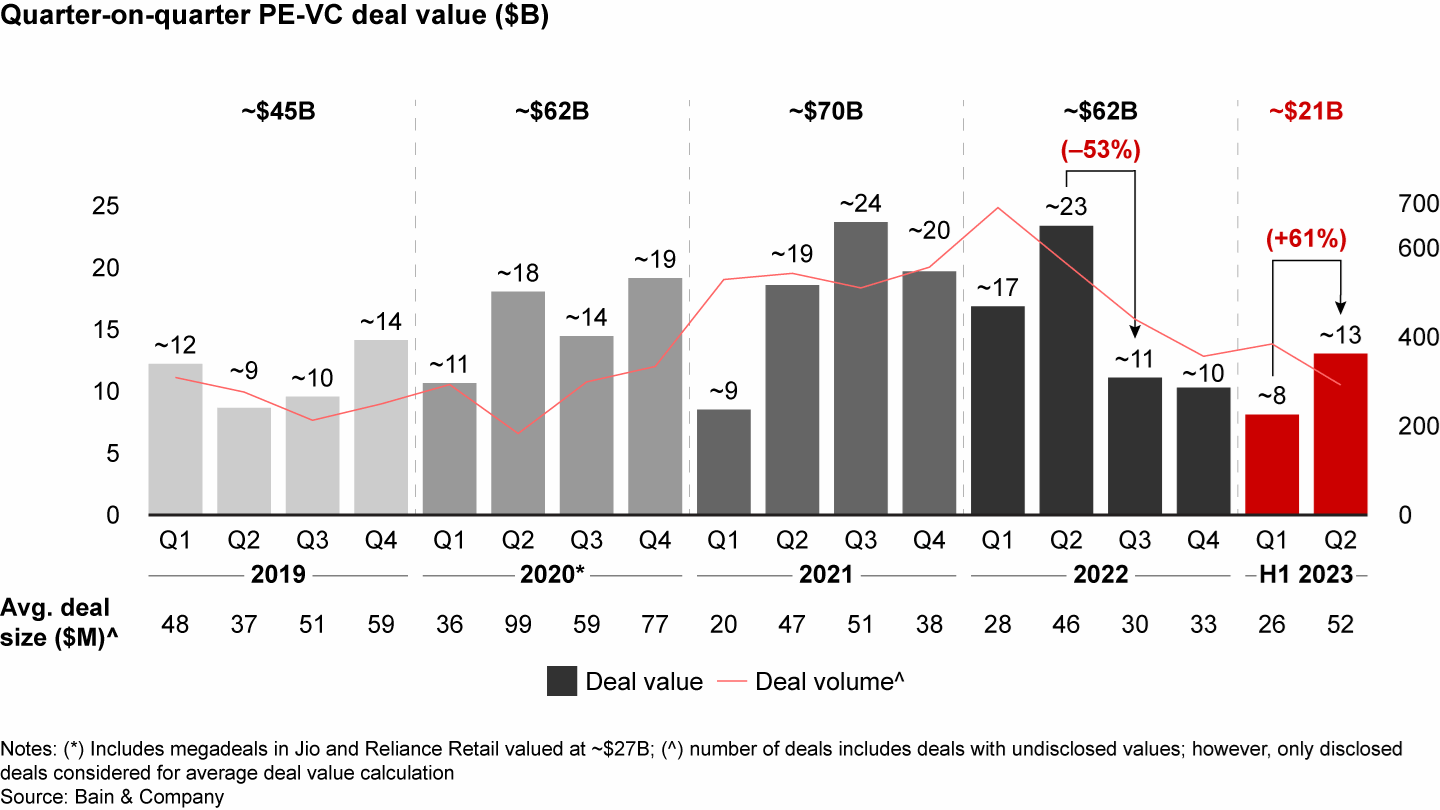Brief

After a three-year-long bumper run, 2023 is seeing a tempering of the exuberant private equity-venture capital (PE-VC) activity witnessed since 2020, amidst a dampening sentiment across global markets. India saw $21 billion in PE-VC investments six months into 2023, in a significant decline against the $40 billion of dealmaking in the same period last year. The past three years have seen India’s PE-VC ecosystem go from strength to strength, experiencing an exceptional bullish run, with more than $60 billion in deal value unlocked each consecutive year since 2020. In 2021, India touched approximately $70 billion in PE-VC investments amidst an abundance of dry powder, low interest rates, and a heated VC ecosystem. Amidst 2022’s dampening activity, India saw around $62 billion of investments as geopolitical uncertainties, tightening monetary policy, and supply chain disruptions converged. At $21 billion, the first half (H1) of 2023 is on par with H1 of 2019, signalling a sharp “reset” for the PE-VC landscape, with a return to baseline before the bumper run.
The compression in deal values is primarily driven by deal volumes, which have continued to taper since the second half (H2) of 2022, declining by 15%, from around 800 in H2 2022 to around 680 in H1 2023 (and 40% between H1 2022’s ~1,250 deals and H2 2022’s deals), indicating slowing investor activity. On the other hand, large deals made a comeback as investors pivoted focus from a long tail of small and midsize cheques to bigger deals. H1 2023 alone saw four megadeals of more than $1 billion, compared to three such deals over the entire previous year. In H1 2023, the share of large deals expanded and average deal size grew approximately 20%, to roughly $37 million.
It is important to point out that even though India witnessed an overall softening of pace in the first half of the year, a quarterly analysis revealed green shoots of optimism. While quarterly deal value dropped from a high of $23 billion in the second quarter (Q2) of 2022 to $8 billion in the first quarter (Q1) of 2023, Q2 2023 was the first quarter to buck the downtrend with an upward trajectory and reach $13 billion in a 60% growth over Q1 2023, propelled by large deals concentrated in the second quarter (see Figure 1).
A quarter-on-quarter view reveals a reversal of the downtrend since mid-2022


Further, India’s PE activity continues to remain robust. Private equity grew approximately 10% against H2 2022, reaching $16.5 billion, which at ~80% of total investments is gradually gaining back share lost to VC and growth equity in 2021. VC and growth equity continued to lose steam, with a ~25% contraction in deal value in H1 2023, compared to H2 2022, to close at approximately $5 billion. VC deal volumes continue to contract as the VC ecosystem assesses the breadth of its portfolio investments and recalibrates its approach. Venture capital and growth equity investors poured money, over multiple rounds, into two assets that contributed around 30% of VC and growth deal value, PhonePe and Lenskart, revealing an intent to deploy capital in marquee assets, with investors still flush with fresh dry powder.
In another sign of reset, the share of sectors such as banking, financial services, and insurance (BFSI); healthcare; energy; and consumer and retail is back to pre-Covid levels of approximately 75%, reversing the share overtaken by information technology (IT), software as a service (SaaS), and consumer tech during the frenzy of 2021–22, which contributed more than 70% of all deal value in that period. IT/information technology enabled services (ITeS) lost around 6 percentage points from the share in 2022, due to stalled megadeal activity, e.g., the largest ITeS deal was Xoriant at roughly $250 million (vs. multiple deals of more than $250 million in 2022, including CitiusTech, IGT, Fractal). Consumer tech lost ~13 percentage points per share vs 2022, as the heated consumer tech activity of the previous two years continued to subside. Three sectors contributed to more than 50% of all deployed capital: energy, with ~21% share of value in H1 2023; BFSI, with ~17% share; and healthcare, with ~15% share. Further, these three sectors expanded in share and value during 2022 and dominated top deals—with $1 billion deals in Manipal Hospitals and HDFC Credila, followed by large deals in Greenko Energy, DMI Finance, Aditya Birla Capital, and CleanMax energy, to name a few. Specifically, the first half of 2023 brought BFSI to the forefront. Investments in non-banking financial institutions gained momentum, driven by rising demand for borrowing, with a spotlight on education financing, through deals such as HDFC Credila by BPEA EQT and ChrysCapital, and Avanse Financial Services by Kedaara Capital.
Buyouts and majority-stake acquisitions have picked up significantly in 2023, with activity concentrated in traditional sectors. Notable majority-stake deals are Temasek’s investment in Manipal Hospitals (healthcare), BPEA EQT and ChrysCapital’s deal in HDFC Credila (BFSI), ADIA and GIC’s follow-on investment in Greenko Energy (energy), and Carlyle’s buyout of VLCC Wellness (consumer and retail). With $6.4 billion in buyout activity at 39% of PE deal value within six months, 2023 is set to surpass the buyout activity of 2022 and is already a record year for non-IT buyouts, relative to recent years.
Exit activity marginally slowed in H1 2023 but managed to remain relatively buoyant to reach approximately $10 billion in that half of the year, exceeding the pre-2021 annual baseline of ~$9 billion. Public market sales and secondary sales have ramped up to dominate around 90% of exit value, enabled by buoyant public markets and pressure from liquidity-crunched limited partnerships. Notable exits are Manipal Hospitals by select funds (TPG, NIIF), Kotak Mahindra-CPPIB, Sona Comstar-Blackstone, and IBS Software-Blackstone. Non-tech sectors dominated exits as well, reaching ~85% share, with healthcare, logistics, and telecom gaining share on the back of contraction in IT.
A key standout this year has been the emergence of environmental, social, and governance (ESG) as a breakout investment theme—more significant than any other sector-specific theme. ESG-aligned assets attracted $4.5 billion in investments, with $1 in $5 of PE-VC investment going to ESG. The growth is primarily driven by strong tailwinds from energy transition, with more than 80% share of clean energy led by marquee investments in Greenko, ReNew Power, CleanMax, and Adani Green Energy, among others. For several years, ESG in India has been dominated by ~15 investors across private equity, including CPPIB, GIC, ADIA, KKR, Brookfield, and dedicated ESG/impact investors like Actis and TPG Rise, who have channelled approximately 50% of nearly $24 billion in ESG investments since 2018. While top investors remained focused on clean energy and electric mobility within India, smaller segments such as sustainable food, health, and circularity continue to emerge with smaller assets.